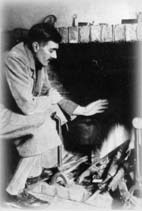 Established now as a writer of merit and with steadier prospects of income, Henry felt that it was time to leave Georgeham. He had heard that there was a vacant cottage thirty miles away on the estate of Lord Fortescue at Filleigh near South Molton. Negotiations were successful and the family moved to Shallowford, where HW set about improving the fishing in the River Bray which ran through the Deer Park, and to which he had the fishing rights.
Established now as a writer of merit and with steadier prospects of income, Henry felt that it was time to leave Georgeham. He had heard that there was a vacant cottage thirty miles away on the estate of Lord Fortescue at Filleigh near South Molton. Negotiations were successful and the family moved to Shallowford, where HW set about improving the fishing in the River Bray which ran through the Deer Park, and to which he had the fishing rights.
Articles, broadcasts and books followed apace. The early volumes of The Flax of Dream were revised to fit in with the more mature genre of the writer, and later a mystical pendant volume, The Starborn, was added to it. A second return to the battlefields of the Western Front gave the impetus for The Wet Flanders Plain. The Village Book and The Labouring Life captured his early days in Georgeham whilst he used an exciting trip to the United States of America as the basis for his novel The Gold Falcon. This book was published anonymously and caused a great stir. On Foot in Devon and Devon Holiday were the result of wanderings through the countryside of his home county, and read as if one was actually conversing with the author.
He bought a fast and expensive sports car, an Alvis Silver Eagle, dressed in good clothes, was a member of the yacht club at Instow, went skiing and even tried to learn to fly, though his instructor said he was unteachable, and soon refused to take him up! He also indulged in several extra-marital affairs, for he was forever seeking for a perfect, almost mythical, being, a real-life expression of Wagner’s ‘Isolde’, whom he epitomised as ‘Barleybright’, but whom he never found: for she could not exist in real life. It was at this time that he met Ann Thomas, daughter of the poet Edward Thomas, who became his secretary and his mistress and bore him a child.
But all the time he was working towards what was to be the next great book, Salar the Salmon, which, like Tarka the Otter, was acclaimed by the critics. The book drained HW of his immediate enthusiasm for the Devon landscape. He had for the time being written all that he could of that area. The family had grown fast, Margaret, Robert, and young Richard had joined the two elder sons. The tale of their childhood is immortalised in The Children of Shallowford.
But it was a time of change. In his personal life Henry had suffered the deaths of two of his best friends: T. E. Lawrence, who had died after a motorcycle accident sustained as he returned from sending HW a telegram arranging a meeting for the following day, and Victor Yeates, his friend from schooldays, whom he had helped with his book Winged Victory. Shortly after this HW visited his great friend Sir John Heygate in Germany, and became fascinated by the spirit of change he found there. His enthusiasm was fired by the German Youth Movement started by Adolf Hitler, and by the move towards cleanliness and order and the emphasis on agriculture as a basis for life. This led him to make the fatal mistake, that was to haunt his future life, of believing that Hitler was fundamentally a good man.
Stirred by the ominous news in Europe, he decided to become a farmer and work the land. Goodbye West Country was his farewell to Devon as he migrated north-east, the Alvis sports car pulling trailers of furniture, books, wife and five children.
